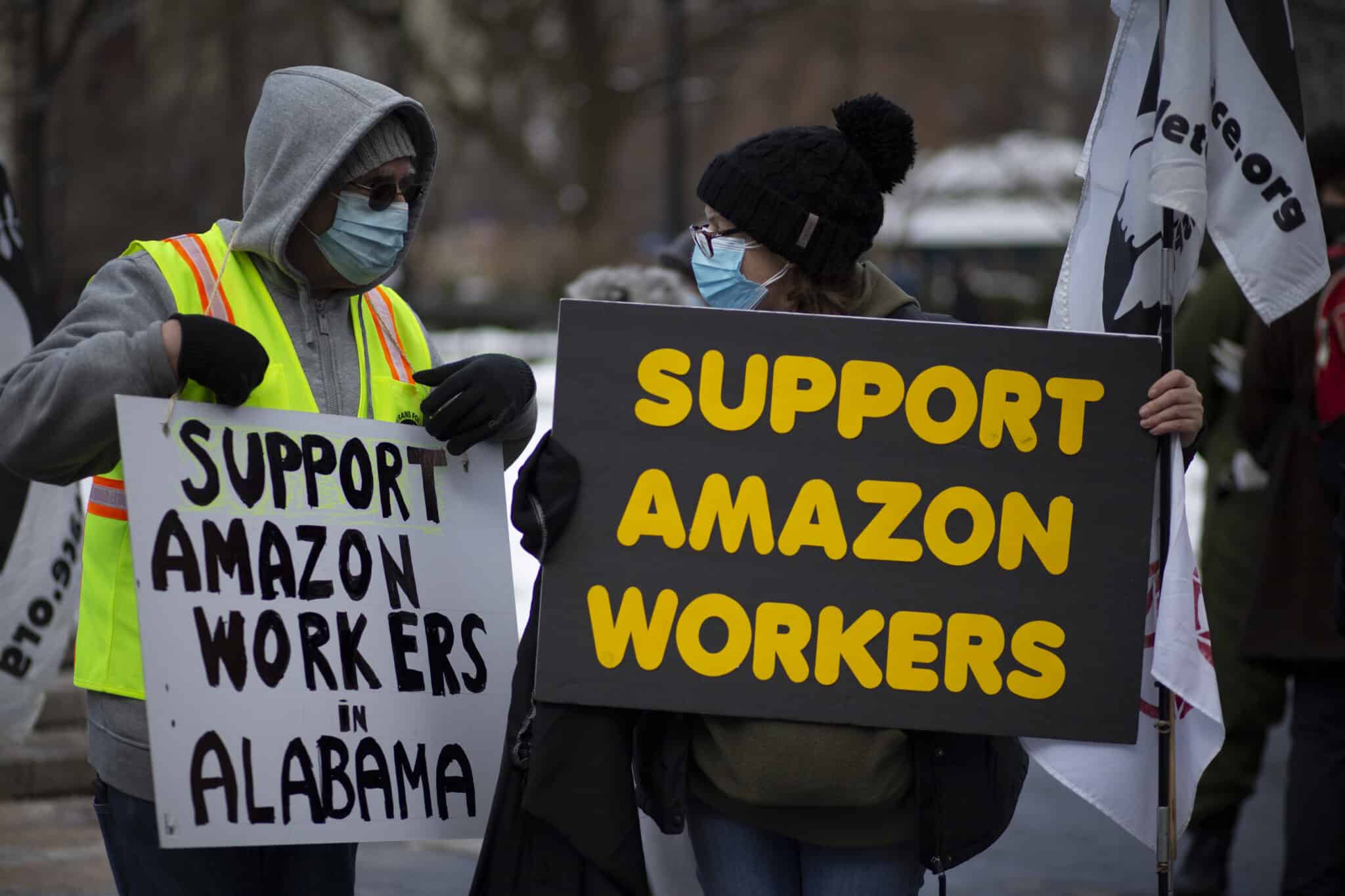William Greenlaw is a student at Harvard Law School.
Unionization efforts at Amazon have revived, this time from a group of workers in a Staten Island distribution center. The workers have already collected 1,700 signatures and say they will have enough support to initiate a unionization vote with the National Labor Relations Board by Monday. The organizers of the efforts are current and former Amazon employees who seek to create an independent union called the Amazon Labor Union. Christian Smalls, a former warehouse employee, is hoping to seize on worker-leaning labor market conditions to come to a union victory. Using the clout of having been an employee, Smalls and his team have been able to rally support from a position of trust. “To get a card signed from a worker is difficult,” Small said, “It is a harder conversation to have when you are a third party rather than someone who works at the company.” Predictably, an Amazon spokesperson said that the company does not believe a union to be in the best interest of its employees. Behind closed doors, Amazon’s stance has been less than sanguine. Earlier in the pandemic, after Smalls organized a protest on safety conditions, Amazon fired him. And leaked meeting notes have revealed disparaging remarks made about him as being “not smart or articulate.” This drive comes amid a labor market which have given many workers a stronger hand, as workers at John Deere, Nabisco, and Kellogg have gone on strike, and many of Hollywood’s workers narrowly avoided strike. Workers have seen success in recent months, and a union victory at Amazon may be on the way.
Union drives have also continued to success elsewhere, this time in an industry often historically overlooked: the video game and entertainment industry. Workers at Paizo, one of the largest tabletop roleplaying companies in the world, have officially formed a union called the United Paizo Workers. Pathfinder, one of the games published by Paizo, is played by customers around the world in 36 countries. However, the UPW said, “Paizo’s workers are underpaid for their labor, required to live in one of the most expensive cities in the United States [Seattle], and subjected to untenable crunch conditions on a regular basis.” Crunch refers to long, mandatory overtime under timed conditions at or near the launch of a product in the gaming industry. One former employee took to Twitter to lay bare allegations that the company engaged in “unfair hiring and disciplinary practices, unclean working conditions, sexual harassment, and verbal abuse.” All of these concerns led to workers pressing to form a union. The UPW received assistance from the Communications Workers of America, who have been working to organize the video game industry at large.
Activision Blizzard remains embroiled in controversy over its poor treatment of its employees. Now, Activision faces dueling lawsuits from the Equal Employment Opportunity Commission and California’s Department of Fair Employment and Housing. Activision has attempted to file an ethics violation against the California agency for allegedly violating attorney ethics rules. Meanwhile, the Communications Workers of America have grown concerned that the EEOC’s settlement, worth only $18 million, is nowhere near enough to atone for systemic abuse of employees, calling the amount “woefully inadequate.” For comparison, shareholders recently approved a seismic $155 million salary for Activision’s CEO, making the settlement of harassment claims total a little over a month of his salary. Activision, for its part, has internally reeled from the growing controversy. It was recently revealed that the company has already fired 20 employees as a result of sexual harassment complaints in the workplace.
Elsewhere in the technology industry, Facebook is being forced to pay up to $14 million to settle a U.S. lawsuit alleging employment discrimination. Facebook allegedly intentionally favored foreign-born employees for its job positions. The company intentionally “channeled” visa-holders by stopping some advertising for positions on its career website, requiring physically mailed job applications, and just flatly refusing to consider some U.S. workers at all. Speaking on the matter, U.S. Assistant Attorney General Kristen Clarke said, “Facebook is not above the law, and must comply with our nation’s federal civil rights [protections].” The settlement proceeds will be split two ways: $4.75 million in the form of a fine and up to $9.5 million to eligible people impacted by the discrimination. Facebook must also train its employees on anti-discrimination measures and commit to recruiting more U.S. workers.






Daily News & Commentary
Start your day with our roundup of the latest labor developments. See all
February 13
Sex workers in Nevada fight to become the nation’s first to unionize; industry groups push NLRB to establish a more business-friendly test for independent contractor status; and UFCW launches an anti-AI price setting in grocery store campaign.
February 12
Teamsters sue UPS over buyout program; flight attendants and pilots call for leadership change at American Airlines; and Argentina considers major labor reforms despite forceful opposition.
February 11
Hollywood begins negotiations for a new labor agreement with writers and actors; the EEOC launches an investigation into Nike’s DEI programs and potential discrimination against white workers; and Mayor Mamdani circulates a memo regarding the city’s Economic Development Corporation.
February 10
San Francisco teachers walk out; NLRB reverses course on SpaceX; NYC nurses secure tentative agreements.
February 9
FTC argues DEI is anticompetitive collusion, Supreme Court may decide scope of exception to forced arbitration, NJ pauses ABC test rule.
February 8
The Second Circuit rejects a constitutional challenge to the NLRB, pharmacy and lab technicians join a California healthcare strike, and the EEOC defends a single better-paid worker standard in Equal Pay Act suits.